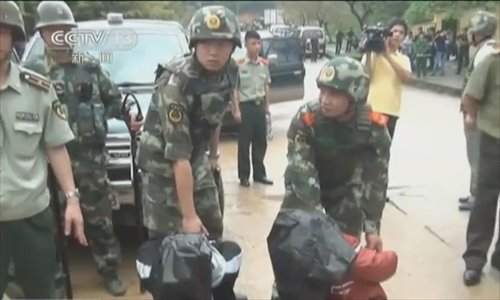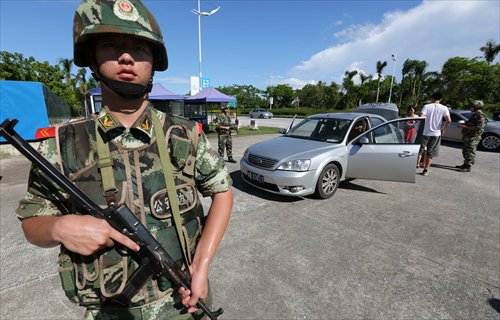HOME >> CHINA
Police crack down on people attempting to leave China to join jihadist organizations
Source:Global Times Published: 2015-1-19 22:38:03

Chinese police hold two people suspected of illegal border crossing transferred by Vietnamese police in April 2014. Photo: courtesy of CCTV

Police officers inspect a car at a border crossing in Beihai, Guangxi Zhuang Autonomous Region on September 3, 2014. Photo: CFP
A group of about 10 people, including children and women, approach the border between China and Myanmar late at night. They attempt to sneak across a ford into Myanmar, but are captured by Chinese police who are waiting in ambush.
Southwestern China has witnessed a spike in people illegally crossing the border into Vietnam and Myanmar in the past two years. Police claim that many people who have attempted to sneak out of China have participated in underground Islamic preaching or have been involved in terrorist activities, and that they have often paid tens of thousands of yuan to get to the Middle East from the Xinjiang Uyghur Autonomous Region.
The police have said that such activities are directed by the East Turkistan Islamic Movement (ETIM) and that the organization encourages these people to carry out attacks locally if they are unable to cross the border.
Terror attacks
A group of attackers dressed in black and wielding long knives went on a rampage at Kunming railway station in Southwest China's Yunnan Province on March 1, 2014, indiscriminately stabbing passengers, leaving 31 dead and another 141 injured.
"In recent years external forces have persuaded people with extreme religious views to go abroad and fight," an official from the Criminal Investigation Department at the Ministry of Public Security, told the Global Times. The criminals at the Kunming station attack were among those barred from attempting to cross the border illegally, police said.
Soon after the Kunming attack, violence broke out in the Vietnamese port of Bac Phong Sinh near the Chinese border on April 18, which led to two Vietnamese military policemen being killed by gunfire.
As a group of Chinese citizens were being repatriated by Vietnamese policemen, their leader distracted the guards, allowing them the opportunity to attack the policemen with wooden chairs and to seize their submachine guns. Eight of the Chinese citizens were shot dead after more armed policemen arrived on the scene.
The subsequent investigation found that all of the 16 detainees were from Xinjiang.
Illegal immigration network
A complicated network facilitating illegal immigration emerged after the Ministry of Public Security (MPS) set up a task force in April last year, with local police from Henan, Guangdong, Sichuan, Yunnan, Guangxi and Xinjiang coming together in May to prevent Chinese citizens from illegally crossing China's southwestern borders.
The police have claimed that these networks are responsible for organizing people in China and helping them cross into Vietnam or Myanmar.
The task force says that it has broken up over 30 such networks since May 2014. One network, led by a man named Wei Hai in Guangxi, attempted to smuggle 300 people out of China between January and April 2014.
After being detained, Wei told police that a man named Eli Emet in Vietnam would get him to transport people to the Vietnamese border at night, whereupon someone would smuggle them across the border. Emet would then help them to leave Vietnam, according to Wei.
Liu Huaming, deputy head of the criminal investigation detachment under the public security bureau of Fangchenggang, Guangxi, said that the illegal emigrants spend between 30,000 and 50,000 yuan ($4,820-8,000) for their whole trip.
The smuggling organizers always made sure that there would be several leaders in each group who could help lead the group if they decided to launch an attack within China, an official with the Criminal Investigation Department told the Global Times.
Footage taken by police, broadcast by CCTV on Monday, shows the moment when, as Fangchenggang police investigated a bus that was attempting to drive into Vietnam on August 30, 2014, one of the passengers pulled out a knife and attempted to stab the nearest officer.
The knife-wielding man suffered injuries after being shot by another officer.
The attacker, a resident of Kashgar in Xinjiang, was later found responsible for inciting other passengers to attack the police. "He tried to attack police with a knife in the presence of over 10 SWAT officers and policemen. He was completely insane," Liu said.
A Guangzhou policeman named Alim told the Global Times that "there are women and children in almost every group of illegal border crossers, to disguise the group as people on a sight-seeing or business trip. They take detours to other provinces first, instead of coming straight to Guangxi's border from Xinjiang."
Religious extremism
The number of people attempting to cross the border illegally has dropped since the MPS task force was set up in April.
Guangxi and Yunnan police seized 166 people between January and April 2014 whereas 34 people were captured from May to June and only one was captured in July.
The police have solved 262 cases in total involving the organizing and transportation of illegal emigrants, arrested 352 suspects and identified 852 suspects since April 2014, the Xinhua News Agency reported on Monday.
A national security officer told the Global Times on Sunday that ETIM was the "backstage manipulator" that was directing the illegal emigration and that political extremism was the root cause of these activities.
They said that ETIM aimed to persuade "ethnic minority people" in China to go to Middle Eastern countries, including Syria, and join terrorist organizations.
Alim said that three people who were recently arrested while attempting to climb mountains on the Chinese-Vietnamese border told people that the person organizing their trip was in Turkey.
The police said that they have found that most people captured while attempting to cross the border had previously participated in underground preaching activities, watched pro-terrorism videos and believed that "if they die as martyrs in jihad they would go to heaven."
Sun Xiaoying, a research fellow with the Guangxi Academy of Social Sciences, said that some of the people who have managed to reach the Middle East via Southeast Asia have gone on to fight with militant groups.
The Criminal Investigation Department official told the Global Times that they have ascertained the identities of some individuals organizing these activities from overseas and have issued "Red Notices" via the International Criminal Police Organization. "We will strengthen our cooperation with the police of Southeast Asian countries … and join hands to arrest ringleaders and key members."
Global Times
Newspaper headline: Traveling for terror
Posted in: Politics